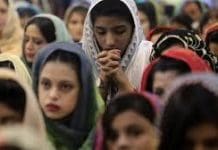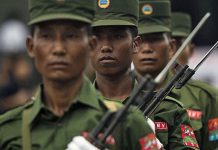By George Whitten, BosNewsLife Senior Special Correspondent
KABUL, AFGHANISTAN (BosNewsLife)– Fighters of the militant group Taliban have killed an international team of eye medics, including eight Christian aid workers, in a remote mountainous area of Afghanistan, officials confirmed Monday, August 9.
Six American and two European aid workers were shot and killed in northern Afghanistan along with two Afghan colleagues as they were returning to Kabul from a medical mission, said the International Assistance Mission (IAM), which dispatched the team.
Local police said they found the bullet-riddled bodies of the aid workers along with two Afghan colleagues on the border between Nuristan and Badakhshan provinces.
The Taliban took responsibility for Friday’s attack, one of the deadliest on humanitarian aid workers in Afghanistan, saying the Christian charity workers were “foreign spies” and were spreading Christianity.
IAM Executive Director Dirk Frans denied these charges saying his organization does not hand out Bibles. “Our faith motivates and inspires us – but we do not proselytize,” Frans told reporters Monday, August 9, after confirming IAM workers were killed. “We abide by the laws of Afghanistan.”
The team of experts who lost their lives were identified as two Afghan Muslims, Mahram Ali and another identified only as Jawed; British citizen Karen Woo, German Daniela Beyer, and Americans Dr Tom Little, Cheryl Beckett, Brian Carderelli, Tom Grams, Glenn Lapp and Dan Terry.
Little, 62, had worked with IAM in Afghanistan for 33 years. Karen Woo, a British surgeon and one of the three women who were killed had written on her Website about the possible risks of traveling to the area.
“The expedition will require a lot of physical and mental resolve and will not be without risk but ultimately, I believe that the provision of medical treatment is of fundamental importance and that the effort is worth it in order to assist those who need it most,” said Woo, who was due to marry this month.
IAM is a registered non-profit Christian organization based in Kabul. The humanitarian aid team had been providing eye care and other medical treatment in Nuristan, a province dominated by Taliban insurgents, according to a statement released by IAM. They were traveling unarmed and without security guards, Frans said.
IAM is the longest-serving non-governmental organization in the country. In their work since 1966 on health and economic development projects, under King Zahir Shah, the Russians, the mujaheddin government and the Taliban, and “all along we’ve been known as a Christian organization. That has been a non-issue,” explained Frans.
“The accusation is completely baseless; they were not carrying any bibles except maybe their personal Bibles. As an organization we are not involved in handing out Bibles.”
The execution-style killings of 10 people working for a Christian medical team, the deadliest since the war began in 2001, seems part of a Taliban strategy to target Western civilians, especially Christians, who are viewed as “foreign invaders,” according to Christian aid workers and other observers.
Frans said he was surpised about the Taliban’s actions. “I like people who stand for a cause, but I think you really need to reflect on what you’re communicating to people – and this would be my suggestion to the Taliban. Think about what you’re doing. Is this the best way of serving God?”, he said.
IAM said on its Website that the tragedy would negatively impact its ability “to continue serving the Afghan people as IAM has been doing.” It said it hopes the killings would not “stop our work that benefits over a quarter of a million Afghans each year.”
Afghanistan’s government has come under international pressure to improve security for international aid workers and to allow more religious freedoms. The country’s constitution is based on traditional sharia, or Islamic, law, which bans religious conversion.
Hundreds of international and Afghan groups are involved in essential humanitarian aid projects across the country, in areas ranging from health to education, but some Afghans remain skeptical of their motives and suspect they could be a front for proselytizing.
Weeks before their ouster in a U.S.-led invasion in 2001, the Taliban detained several Western aid workers after accusing them of proselytizing, but the group was freed in a raid by U.S. Special Forces.
In 2007 Taliban insurgents kidnapped 21 South Korean Christians who were visiting as part of an evangelical church charity group and accused them of proselytizing. Two of the hostages were murdered before the rest were released, although authorities have denied any ransom was paid.








